Hormone Balancing Foods: 16 Foods that Balance Hormones
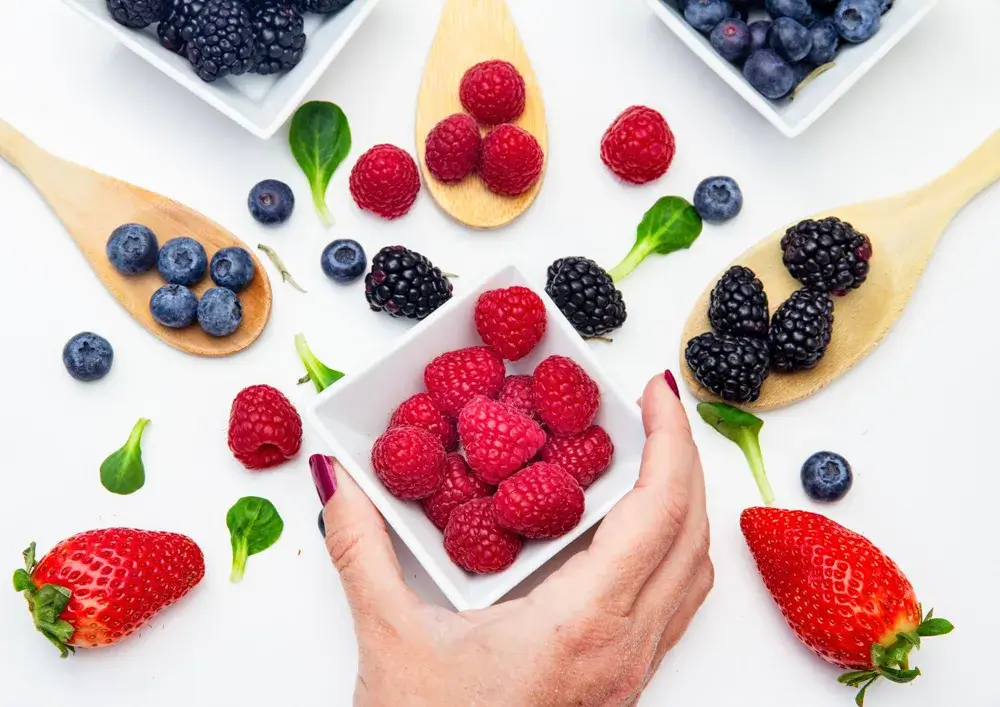
Hormones play a crucial role in our health. They control everything from our energy levels, growth, sleep-wake cycle, to our mood. For women, keeping hormones balanced is particularly important.
Do you sometimes feel that your energy and mood seem out of phase? When hormones are out of balance, you might feel tired, gain weight, or experience mood swings.
But here’s the great news. You can take control of your hormone health through your diet.
Yes. You see, what you eat can make a huge difference.
Let me introduce you to hormone-balancing foods, that will help you feel your best. Simple dietary changes can bring your body into balance.
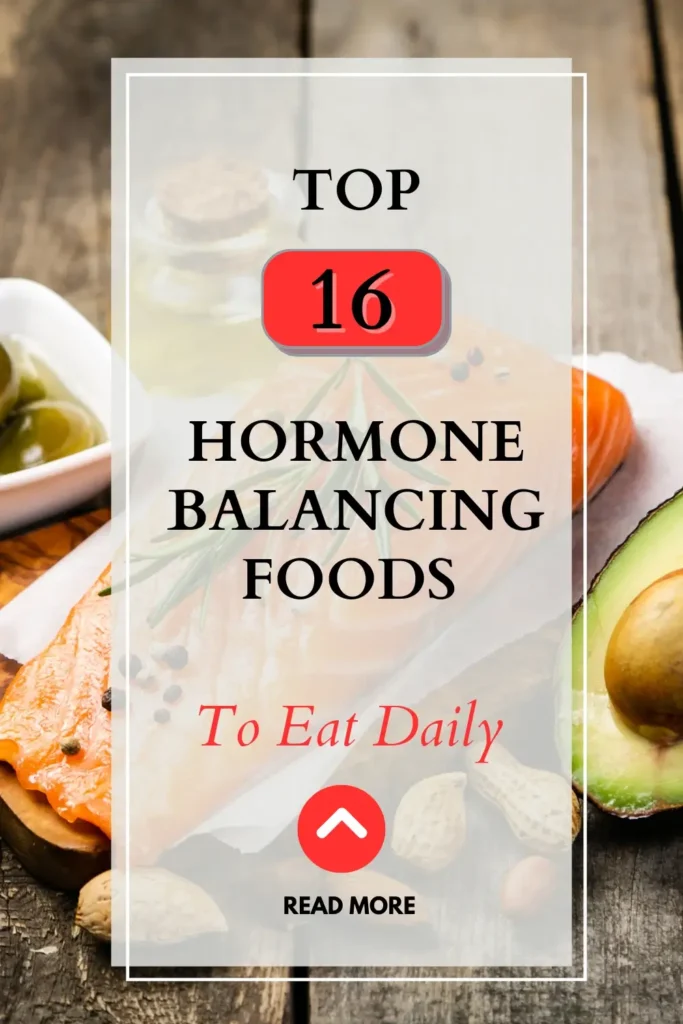
Major Foods That Balance Hormones
Cruciferous Vegetables
Cruciferous vegetables are fantastic hormone-balancing foods. They include broccoli, cauliflower, and kale. These vegetables contain indole-3-carbinol, which supports estrogen metabolism.
1. Broccoli:
High in fiber and antioxidants, it helps detoxify the body. It’s a great addition to any meal. The fiber in broccoli aids digestion, which is crucial for eliminating excess hormones from the body. Additionally, the antioxidants in broccoli fight oxidative stress, which can disrupt hormone production.
Broccoli can be steamed, roasted, or added to soups and stir-fries for a nutritious boost.
2. Cauliflower:
Rich in vitamins and minerals, it assists in regulating hormones. It can be used in a variety of recipes. Cauliflower is particularly high in vitamin C, which supports the adrenal glands that produce stress hormones. It’s also a good source of vitamin K and folate, essential for overall hormone health.
Try cauliflower mashed, as rice, or even roasted for a delicious side dish.
3. Kale:
Packed with nutrients, it supports the liver in processing hormones. It’s perfect for salads and smoothies. Kale is high in iron, which is necessary for energy production, and calcium, which supports bone health and muscle function. The chlorophyll in kale also helps detoxify the body.
You can add kale to your diet by making kale chips, adding it to soups, or blending it into green smoothies.
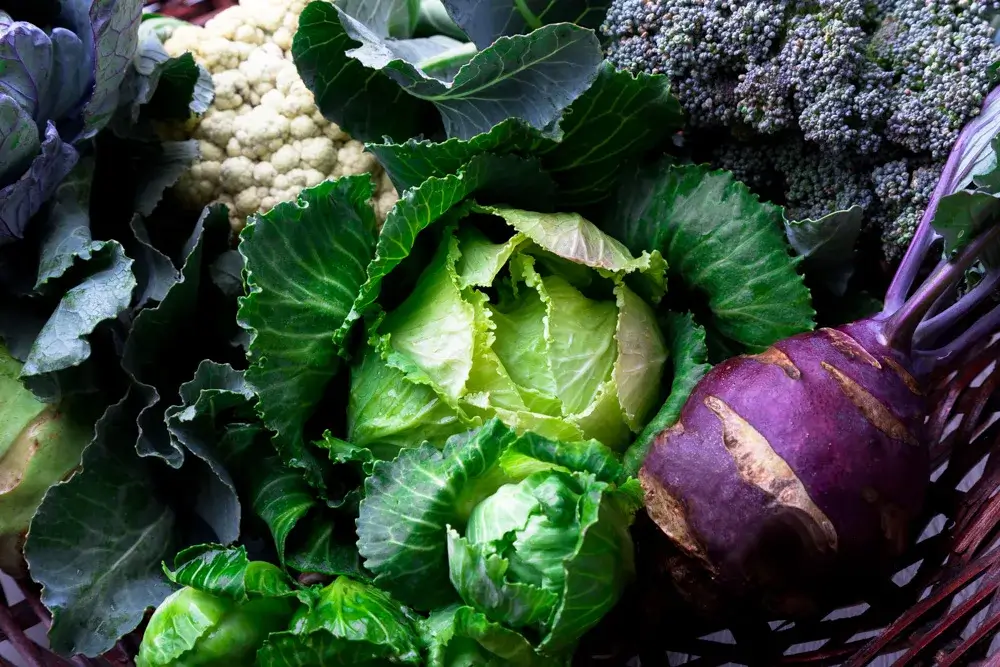
Fatty Fish
Fatty fish such as salmon, mackerel, and sardines are rich in omega-3 fatty acids. These fats are essential for hormone production and overall health.
4. Salmon:
Contains high levels of omega-3s, which reduce inflammation. It’s delicious grilled or baked. Omega-3 fatty acids in salmon help reduce the risk of chronic diseases that can be exacerbated by hormonal imbalances. They also support brain health, which is crucial for regulating mood and stress hormones.
You can enjoy salmon with a squeeze of lemon, a sprinkle of herbs, or as part of a salad or main dish.

5. Mackerel:
Supports brain health and hormone balance. Try it in a hearty stew or salad. Mackerel is also a rich source of vitamin D, which is essential for bone health and immune function. Vitamin D deficiency can lead to hormonal imbalances, so including mackerel in your diet can help maintain optimal levels.
Mackerel can be enjoyed smoked, grilled, or even canned for a quick and nutritious meal.
6. Sardines:
Packed with nutrients, they promote overall health. Enjoy them as a snack or in a pasta dish. Sardines are high in calcium, iron, and vitamin B12, which are all important for maintaining healthy energy levels and reducing fatigue. The small size of sardines means they contain fewer toxins than larger fish, making them a safer choice.
You can add sardines to salads, spread them on whole-grain crackers, or mix them into pasta dishes.
7. Avocados
Avocados are a superfood for hormone balance. They are rich in healthy fats and fiber, aiding hormone production and regulation.
- Healthy Fats: These fats are essential for building hormones. Add avocado to your toast or smoothie. The monounsaturated fats in avocados are critical for maintaining healthy cell membranes, which allow hormones to communicate effectively with cells. These fats also help reduce inflammation, which can disrupt hormone balance. Here is a more detailed article on good and bad fats and which fats you should eat to effectively balance your hormones.
- Fiber: Helps in the elimination of excess hormones. A great addition to salads and sandwiches. The fiber in avocados supports digestive health, which is important for the proper excretion of hormones. Fiber helps prevent constipation, which can lead to the reabsorption of estrogen into the bloodstream, causing hormonal imbalances. You can slice avocados into salads, mash them on toast, or blend them into creamy dressings.
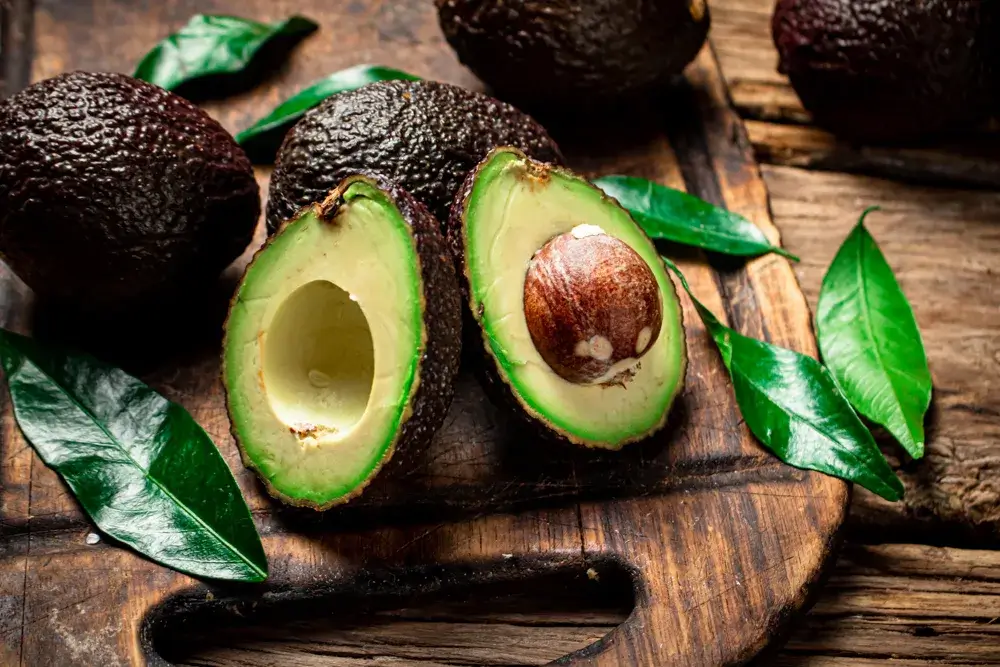
Nuts and Seeds
Nuts and seeds are nutrient-loaded foods. They can help balance hormones effectively.
8. Flaxseeds:
Flaxseeds are high in lignans, which can help balance estrogen levels. These tiny seeds are a rich source of alpha-linolenic acid (ALA), a type of omega-3 fatty acid that reduces inflammation. Lignans in flaxseeds can help modulate estrogen levels in the body, making them especially useful for women experiencing symptoms of estrogen dominance, such as heavy periods or breast tenderness.
You can add flaxseeds to smoothies, oatmeal, or baked goods.
9. Chia Seeds:
Chia seeds provide omega-3s and fiber, supporting overall hormonal health. They are hydrophilic, meaning they absorb water and form a gel-like substance. This helps to slow down digestion and the release of sugar into the bloodstream, preventing insulin spikes. Steady insulin levels are crucial for maintaining balanced hormones.
Sprinkle chia seeds on yogurt, mix them into smoothies, or make chia pudding for a nutritious snack. Interested to learn how to use chia seeds water not only for hormone balance but also to lose weight? Check out this comprehensive guide on chia seeds water, including recipes for several chia seed water variations.
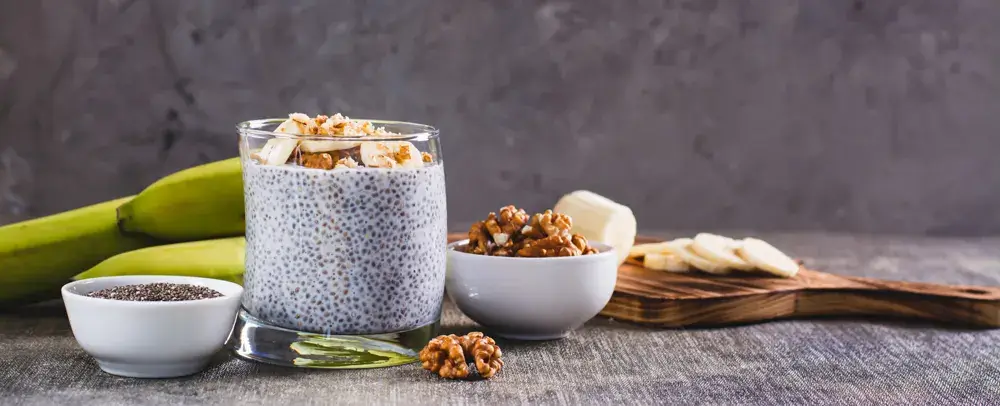
10. Walnuts:
Walnuts are rich in polyunsaturated fats, which are essential for hormone production. They are also high in magnesium, which is important for reducing stress and promoting relaxation. Magnesium deficiency can lead to increased levels of cortisol, a stress hormone that can disrupt other hormones.
Here is a detailed guide to natural cortisol cocktails that can help you manage your cortisol levels naturally.
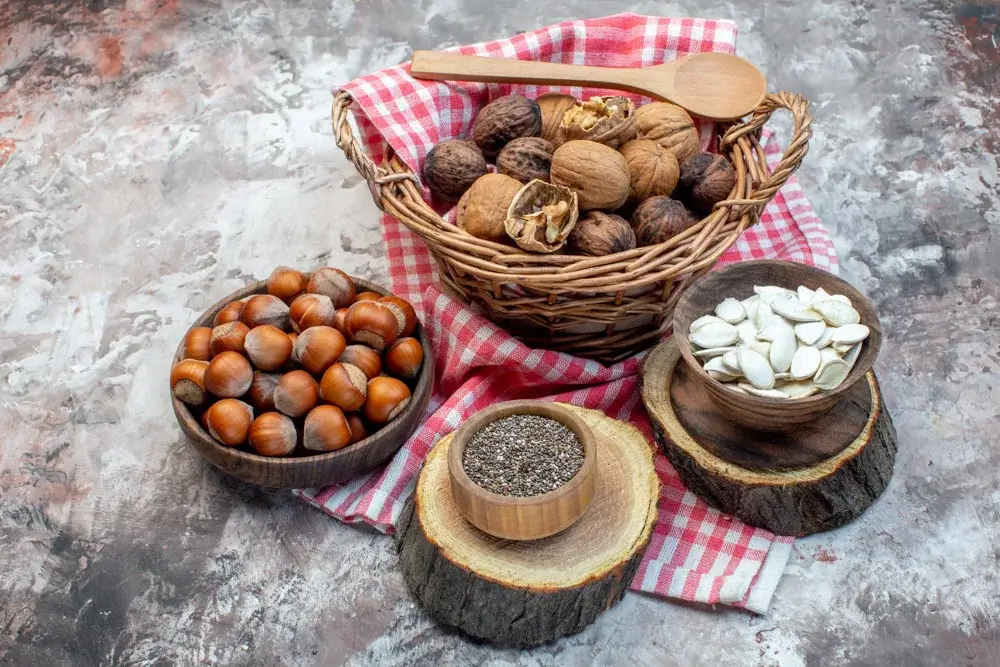
Other Foods That Balance Hormones
Berries
Blueberries, raspberries, and strawberries are not just delicious. They are rich in antioxidants, which protect the body from oxidative stress and support hormone balance. Antioxidants neutralize free radicals in the body, reducing cellular damage and inflammation, which is essential for maintaining hormonal health.
11. Blueberries:
Blueberries are high in vitamin C and antioxidants. These tiny berries help in reducing oxidative stress, which can disrupt hormone production. They are also rich in fiber, which aids in digestion and helps in the elimination of excess hormones.
You can add blueberries to your morning oatmeal or enjoy them as a refreshing snack.
12. Raspberries:
Raspberries provide fiber and essential vitamins. They are high in vitamin C, vitamin K, and manganese, all of which support immune function and hormone health. The fiber content in raspberries helps regulate blood sugar levels, preventing insulin spikes that can lead to hormonal imbalances.
Enjoy raspberries in salads, smoothies, or desserts.

13. Strawberries:
Strawberries support immune function and hormone health. They are packed with vitamins, antioxidants, and fiber, which together help reduce inflammation and support the body’s natural detoxification processes.
They can be added to a variety of dishes, from salads to desserts, or enjoyed on their own.
14. Green Tea
Green tea is a well-known health elixir, revered for its antioxidant properties. It is particularly effective in reducing inflammation, which is crucial for maintaining hormonal balance. The antioxidants in green tea, such as catechins, protect cells from damage and support metabolic processes. Additionally, green tea has been shown to improve brain function, which is essential for regulating mood and stress hormones.
Enjoy a cup of green tea in the morning or as a mid-afternoon pick-me-up to enjoy its benefits.

15. Quinoa
Quinoa is a health-boosting meal that supports overall health and hormone production. As a complete protein, it contains all nine essential amino acids, making it an excellent choice for supporting muscle repair and growth, which is important for your hormonal health. Quinoa is also rich in magnesium, which helps regulate cortisol, the stress hormone. Its high fiber content aids in digestion and helps stabilize blood sugar levels, preventing insulin resistance.
Include quinoa in your salads, soups, or as a side dish to boost your hormone health.
16. Turmeric
Turmeric is a vibrant yellow spice with potent anti-inflammatory properties. Its active compound, curcumin, has been shown to reduce inflammation and support overall hormonal balance. Chronic inflammation can disrupt hormone production, so incorporating anti-inflammatory foods like turmeric can be highly beneficial. Turmeric also supports liver function, which is crucial for detoxifying the body and processing hormones.
Add turmeric to your soups, stews, or make a soothing turmeric tea to enjoy its benefits.

Nutritional Components that Aid Hormone Balance
Certain nutritional components are particularly effective in balancing hormones. Incorporate these into your diet to support hormonal health.
Omega-3 Fatty Acids
Omega-3 fatty acids are essential for hormone production. These healthy fats are crucial for building cell membranes and producing hormones. Foods like fatty fish, flaxseeds, and chia seeds are excellent sources of omega-3s. Omega-3s help reduce inflammation, which can disrupt hormone balance, and support brain health, which is vital for regulating mood and stress hormones.
Fiber
Fiber helps in the elimination of excess hormones. High-fiber foods include fruits, vegetables, and whole grains. Fiber supports digestive health by promoting regular bowel movements, which is essential for the proper elimination of hormones.
A diet high in fiber can help prevent the reabsorption of estrogen, reducing the risk of estrogen dominance, which can lead to hormonal imbalances. Check out this article for high-fiber recipes that will support your hormone balance efforts.
Antioxidants
Antioxidants protect the body from oxidative stress, which can disrupt hormone production. Berries, green tea, and dark chocolate are rich in antioxidants. These compounds neutralize free radicals, reducing cellular damage and inflammation. A diet rich in antioxidants supports overall health and helps maintain balanced hormone levels.

Phytoestrogens
Phytoestrogens are plant-based compounds that can mimic estrogen in the body. Foods like soy, flaxseeds, and chickpeas are high in phytoestrogens. These compounds can help balance estrogen levels, making them particularly beneficial for women experiencing symptoms of estrogen dominance or going through menopause. Phytoestrogens bind to estrogen receptors in the body, helping to regulate the effects of estrogen and maintain hormonal balance.
Foods to Avoid for Balanced Hormones
Just as there are hormone-balancing foods, some foods can disrupt this delicate balance. Avoiding these can help maintain optimal hormone levels.
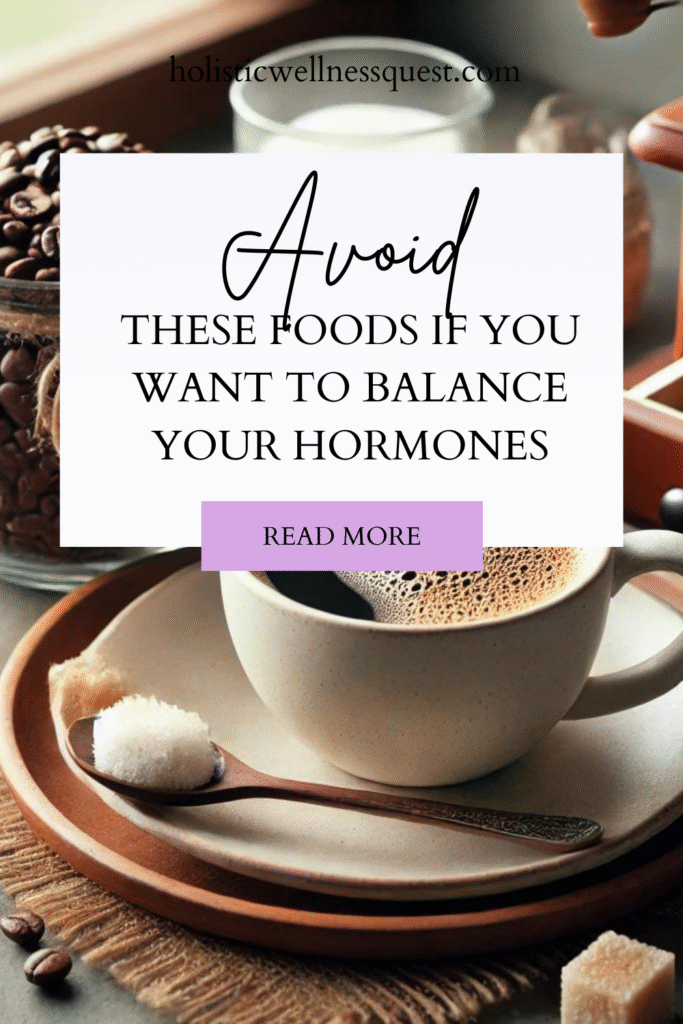
Processed Foods
Processed foods often contain unhealthy fats and additives that can interfere with hormone production. These foods are typically high in trans fats, sodium, and artificial ingredients, which can cause inflammation and disrupt your hormonal balance. Moreover, they can lead to weight gain, which further affects hormone levels. Instead, opt for whole, natural foods to support your body’s hormonal health.
Sugar and Artificial Sweeteners
High sugar intake can lead to insulin resistance, disrupting hormone balance. When you consume too much sugar, your body needs to produce more insulin to manage blood sugar levels. Over time, this can lead to insulin resistance, a condition where your body’s cells become less responsive to insulin. This not only affects your blood sugar but also disrupts other hormones like cortisol and estrogen. Artificial sweeteners aren’t much better. They can negatively impact gut health and hormones.
Aim to reduce your sugar intake with this no-sugar food list and choose natural sweeteners like honey or maple syrup if you must consume sugar.
Caffeine
Excessive caffeine can increase cortisol levels, leading to hormonal imbalances. Cortisol, the stress hormone, is necessary in small amounts, but too much can wreak havoc on your body. High cortisol levels can interfere with sleep, digestion, weight, and even your immune system.
If you’re a coffee lover, try to limit your intake and consider switching to herbal teas like chamomile tea, which can be more soothing and less impactful on your hormones.

Alcohol
Alcohol can disrupt the endocrine system, affecting hormone levels and liver function. Your liver is crucial for processing and eliminating excess hormones. When you drink alcohol, your liver focuses on metabolizing the alcohol instead of processing hormones, which can lead to an imbalance. Additionally, alcohol can increase cortisol levels and disrupt sleep patterns.
Reducing alcohol consumption can significantly benefit your hormonal health.
Trans Fats
Trans fats found in fried and processed foods can interfere with hormone production and increase inflammation. These unhealthy fats are often found in fast foods, baked goods, and margarines. Trans fats not only increase the risk of heart disease but also contribute to chronic inflammation, which can disrupt hormone production.
Choosing healthy fats, such as those found in avocados, nuts, and olive oil, can support hormone balance and overall health.
Sample Meal Plan for Hormone Balance
Incorporate these hormone-balancing foods into your daily meals with this three-day sample meal plan. This plan includes a variety of nutrient-dense foods to support not only your hormonal health but also your overall health.
First Day:
- Breakfast: Smoothie with spinach, avocado, chia seeds, and berries. Green tea.
- Lunch: Quinoa salad with kale, chickpeas, and a lemon-turmeric dressing.
- Dinner: Baked salmon with a side of steamed broccoli and cauliflower.
- Snacks: A handful of walnuts, fresh berries.
Second Day:
- Breakfast: Greek yogurt with flaxseeds and raspberries. Green tea.
- Lunch: Grilled chicken salad with mixed greens, avocado, and a balsamic vinaigrette.
- Dinner: Stir-fried tofu with mixed vegetables and quinoa.
- Snacks: Sliced cucumber with hummus, a small handful of almonds.
Third Day:
- Breakfast: Overnight oats with chia seeds, almond milk, and blueberries. Green tea.
- Lunch: Lentil soup with a side of mixed greens salad.
- Dinner: Grilled mackerel with roasted sweet potatoes and asparagus.
- Snacks: A few dark chocolate pieces.
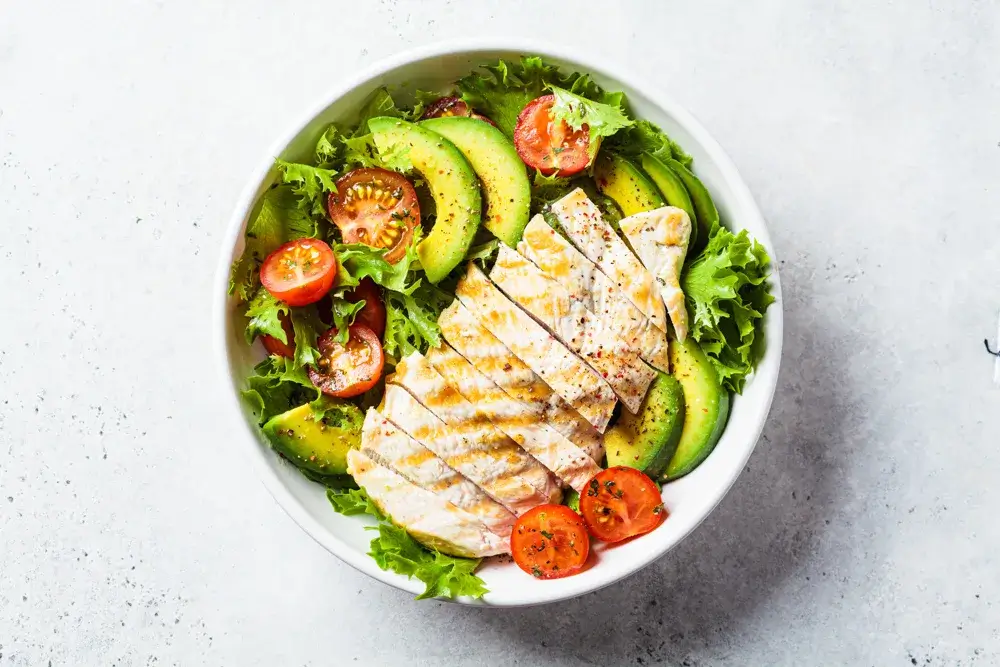
Lifestyle Tips to Support Hormone Balance
In addition to diet, lifestyle choices play a vital role in maintaining hormone balance. Here are some tips to support your hormonal health.
Regular Exercise
Exercise helps regulate hormones and can reduce stress levels. It boosts endorphins, improves insulin sensitivity, and helps maintain a healthy weight, all of which are important for hormonal balance.
Aim for a mix of cardio, strength training, and flexibility exercises for overall health. Here is a quick 30-minute workout routine that covers cardio, strength training, and flexibility, and that you can do in the comfort of your home.
Stress Management
Practices like yoga, meditation, and deep breathing can help manage stress, which is crucial for hormone balance. Chronic stress increases cortisol levels, which can disrupt other hormones.
Taking time each day to relax and unwind can significantly impact your hormonal health.
Adequate Sleep
Ensure you get 7-8 hours of quality sleep each night to support hormone production and regulation. Poor sleep can disrupt cortisol, insulin, and ghrelin levels, leading to increased stress, appetite, and blood sugar issues.
Create a bedtime routine that involves good sleep hygiene and promotes restful sleep, such as limiting screen time and keeping a regular sleep schedule.

Conclusion
In conclusion, balancing your hormones through diet is not only possible but highly effective.
By incorporating these hormone-balancing foods into your meals and avoiding foods that disrupt your hormones, you can support your hormonal health and overall well-being. Start today and you will notice the positive changes in your energy, mood, and health.
Remember, a balanced diet combined with a healthy lifestyle can make a significant difference in maintaining hormonal balance.
Consume the right food and restore the equilibrium.